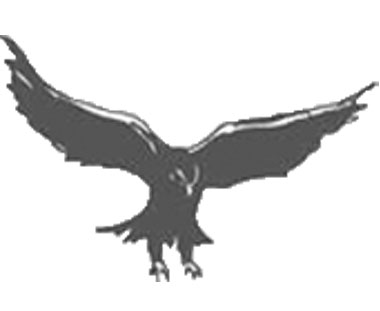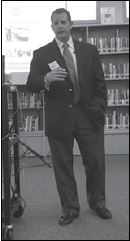Caroline Provost
Priddy spoke to various students in
attendance on the many features of UAVS.
Caroline Provost
Students crowded into the lower
half of Hanover’s library on December
5 to hear Director of National Unmanned
Aircraft Systems Operations
John Priddy discuss unmanned aircrafts,
referred to by many as drones,
their usage and role in law enforcement
as well as border protection, privacy
and other related topics.
Priddy began by explaining the
function of the Department of US
Customs and Border Protection as
a whole. Under the Department of
Homeland Security, it is comprised
of three operational elements, one
of which being the Office of Air and
Marines, which is responsible for all
maritime vessels and aircraft that the
US Customs and Border Protection
owns and operates as well as houses
the unmanned aircraft program.
“We have roughly 274 aircraft and
about an equal number of vessels. So,
we’re actually one of the largest air
raid law enforcement forces in the
world,” Priddy said.
Priddy stressed that the intent
of the development and use of unmanned
aircraft systems (UAS) is not
one of militarizing law enforcement,
but that they are a result of an era of
vast technological advancement.
“This is the future,” Priddy said.
“You are going to see a lot aircraft
coming into the national airspace that
are unmanned because they give us
the benefit so that we don’t have overmanned
aircraft.” He concluded that
the UASs would be more efficient and
safer, the pilot being able to operate
the aircraft from the ground instead of
from up above. As the lecture progressed, the question
of privacy arose and whether,
when flying a UAS across the US,
there are any limitations as to what
action law enforcement can take if illegal
activity is spotted at a household
or residential area. In response, Priddy
cited various Supreme Court decisions
on airborne surveillance, one of
which pertained to drug eradication,
which stated that the aircrafts have
the right to reside in the states and, if
there is a reasonable suspicion that illegal
activity is taking place, they have
the right to take action.
For students interested in pursuing
a career in aviation, Priddy mentioned
a number of colleges and universities
that specialize in the technology, including
the University of North Dakota,
Ohio University, Kansas State and
the University of Virginia. If college is
not in the cards, according to Priddy,
a person working in law enforcement
or coming out of the service that has
flown a predator for the past five years
is also eligible to come work for him.
“We are recruiting,” Priddy said.
Students in attendance included
those of history teacher Justin Godard’s
AP Government class, history
teacher Chris Pace’s Advanced Government
class, NHS members as well
as the robotics team.
In a private interview, Priddy explained
his responsibilities in further
depth, as well as the role of the aircraft
in protecting the northern and
southern borders.
“A lot of what I do is working with
my partners over in the position side
and make sure that they get the right
equipment and setting up operations
for long term deployments,” Priddy
said. “We have a variety of sensors that
we put on the aircraft, [one of which
being] a ground radar that looks for
people moving. A lot of what we do
is identifying illicit traffic moving
across the border and passing that information
to our ground enforcement
agents so that they can take action.”
He also underscored how far the
UAS has come since its conception
and the progress that has been made
on behalf of the Office of Air and Marines.
“We’ve had the aircraft since 2007.
We’re at a point where we’ve matured,”
Priddy said. “We’re flying daily
operations along the northern and
southern borders. This is a technological
push well above the requirement.”
Priddy hopes to get about 20 more
years of use out of the manned aircrafts
before they are officially retired.
Priddy is just one of the several
guests who have come to Hanover to
take part in the National Honor Society’s
Speaker Series, which aims to
bring talented individuals to talk to
students about their professions and
share the insight and skills that they
have obtained over the years.
Club Sponsor Chad Taylor previously
worked for the National Press
Club in Washington, one of his duties
being to help put together the
National Press Club Speaker Series,
which featured distinguished guests
ranging from “book authors to kings
and queens.” After eagerly accepting
the role of club sponsor of NHS, Taylor
was more than excited to implement
his previous knowledge to its
members.
“When I thought about some of
the things that NHS could be doing
as a service to our school, I thought it
would be cool. It’s also important to
me to teach some of the skills, to NHS
members who are interested, that they
can carry into their professional life,”
Taylor said. “I want Hanover kids to
have a leg up.”
Taylor believes that the series has
hit the ground running, elevating
National Honor Society members as
well as the student body to their utmost
potential, already bringing three
guests to HHS.
“There is a lot of potential with
our National Honor Society that we
haven’t even started to tap yet,” Taylor
said on an optimistic note.
Priddy was born in Williamsburg,
Va and also has various relatives living
in Hanover County. His previous
professions include serving as Crew
Chief and 2nd Lieutenant under the
Maine Army National Guard, Medevac
Platoon Leader while being stationed
in the Balkans and Attack Helicopter
Company Commander while
stationed in Afghanistan.

